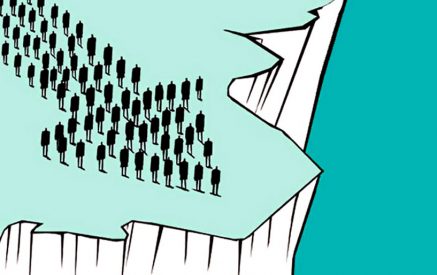What is the difference between ideological and utopian approaches?
The word “salvation” often meets in political and public discourse recently. By using this notion, the oppositional circles mean that with their activities they foster the salvation of Artsakh, Armenia, and the motherland, in general. And supporters of the government deride them saying “look at the saviors, who do you think are you?”
I understand salvation in a radically different way. I think that word is primarily addressed to the individual and his soul. If the person wants to be saved, then I think he, first of all, needs to approach himself with the same strict criteria by which he approaches others. This is how I understand the call to love another – love the other equally. This is a very practical commandment that we break every second. If I take 1000 drams out of someone else’s pocket, it’s nothing as I earn my living, but if someone else does that – “wow, what is he doing?” If I block the street then it is just an uprising of people, if others block the street, then it is a dirty game of revanchists. This is because I love myself more than others.
I think “to be saved” means to approach every single question firstly from the human point of view, and then from the public, political, and ideological points of view. Since I have been working on TV already almost 40 years can you imagine how many times, I have made mistakes? Now if my colleague makes a mistake, do I have a right to judge him? If I am getting angry almost every day because of some small thing, and I even sometimes say Satan’s name, then can I judge strictly a woman of my age who could not restrain.
Read also
I think “survival” is possible not with the ideology but with utopia. The author of this contrast is the British sociologist, Karl Mannheim. According to him, the ideology legitimizes the already existing conditions: this is right, this is wrong, these are good, these are bad. Utopia (or anti-utopia) is not a fantasy about desirable or undesirable situations as sometimes it is presented, but it is a unique mental experience – what, if …
For instance, Thomas Hobbes makes such a mental experience basing his reasoning on the assumption of what would happen if there are no states. In that case, according to Hobbes, people would be busy tearing each other apart from sunset to sunrise because the survival instinct, intelligence, and inclination to high spiritual values are in human nature. According to the English philosopher, coexistence is not a part of our nature. Hobbes did not dream that people would eliminate each other nor did he warn to prevent it but he simply used utopia to justify the need for a state, for the public contract.
I think that the biblical utopias, “to be saved”, seeking the kingdom of heaven, are not desires for some heavenly and perfect situations, it’s not a threat as well of “punishment” and hell. It’s just ground for the need for certain behavior. I believe that “love your neighbor as yourself” behavior is rational, it ensures a person’s inner peace. At, the behavior is demonstrative, too zealous, or “ritual”, then it’s not going to benefit either the person or his neighbor. It becomes the same ideology, in the sense that the word is used here.
Thomas Merton, a well-known monk in the 20th century, notes that some of the monks were doing their job so thoroughly that it was turning into a mockery. Normal, patient, reliable, humorous people were succeeding who did nothing extraordinary, just followed the rules. I think this also applies to the seculars. So, they are wrong who say that they are saving someone or something. Those who make fun of these people are also wrong. But people who are shouting claiming that they are being saved are also wrong.
Aram ABRAHAMYAN






















































